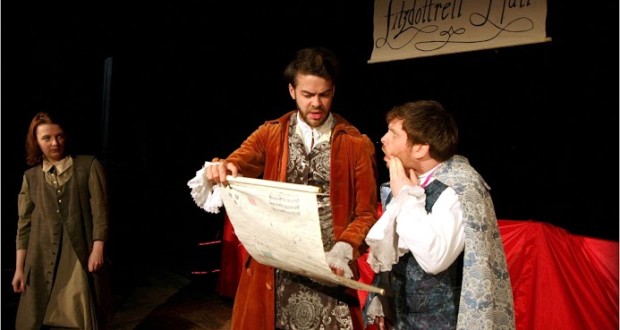Pros: First performed 399 years ago, this play still makes us laugh in its representation of some of the human vices we’re more familiar with, like jealousy and greed.
Cons: When sitting side-stage, it’s difficult to read the banner above the actors’ head, although this is not essential to follow the plot. An amusing story of a clumsy devil determined to fool around with humans. Definitely worth the effort required to understand the Shakespearean language.
Summary
Rating
Good
What a better location to represent a Jacobean play than the authentic Rose Playhouse? This theatre was built on the Bankside in 1587 and re-discovered partially in 1989, thanks to an excavation project. Be prepared to enter an archaeological site, devoid of facilities and heating but full of energy.
A few minutes into the show, I feared it was going to be a tough one for me. English is not my first language and I’ve got a limited knowledge of its classical literature, let alone Renaissance theatre and its archaic speech. In the end, I was pleasantly surprised by a smoothly flowing play, well supported by the physical eloquence of the actors and rich in comedy moments.
The Devil is an Ass is a palatable play written in 1616 by Ben Jonson, who wanted to depict satirically his contemporary London and its most nonsensical trends, like the growing enthusiasm for the dark arts or the new cosmetic fashions described in detail by a Spanish woman – embodied by the seductive Monty D’Inverno in drag. Jonson’s sarcastic remarks are still actual and amiably shared by a public which is often laughing loud.
The story opens in the underworld, where Pug, a young devil, is trying to convince his master to send him on earth and let him have some fun with the humans and their vices. After an initial scepticism, the chief devil finally decides to dispatch him to London as a servant of the foolish Fitzdrottel (Michael Watson-Gray), a gentleman who has demonstrated an insistent inclination towards the dark forces. By the end of his terrestrial adventure, the poor imp will have paid a high price for his naivety, after realising that all his tricks are superfluous among such a ruthless society, populated of crooks and philanderers.
Lewis Chandler is brilliant in Pug’s clothes. He brings to the character a cute clumsiness and, thanks to his recurrent blushing and crumpling eyebrow, spreads excitement or disappointment across the audience.
The rest of the cast, in period costumes, works gracefully on the tiny stage, while musical intervals accompany each change of scene, according to the tradition. The set is nothing more than few chairs and a red drape, whereas the underwater remains of the original Tudor building offer the best set to the scenes in hell.
Grab a blanket on your way in and don’t miss the chance to stay after the performance, as the volunteer stewards will have something to say about the history of this fascinating venue, which has once hosted the likes of Shakespeare and Marlowe.
Author: Ben Jonson
Director: Jenny Eastop
Producer: Mercurius
Booking Until: 28 November 2015
Box Office: 020 7261 9565
Booking Link: http://www.wegottickets.com/f/8973
 Everything Theatre Reviews, interviews and news for theatre lovers, London and beyond
Everything Theatre Reviews, interviews and news for theatre lovers, London and beyond



